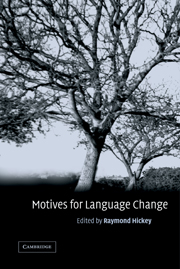Book contents
- Frontmatter
- Contents
- Notes on the contributors
- Acknowledgements
- Introduction
- Part I The phenomenon of language change
- Part II Linguistic models and language change
- 3 Metaphors, models and language change
- 4 Log(ist)ic and simplistic S-curves
- 5 Regular suppletion
- 6 On not explaining language change: Optimality Theory and the Great Vowel Shift
- Part III Grammaticalisation
- Part IV The social context for language change
- Part V Contact-based explanations
- Part VI The typological perspective
- Index
- References
6 - On not explaining language change: Optimality Theory and the Great Vowel Shift
Published online by Cambridge University Press: 22 September 2009
- Frontmatter
- Contents
- Notes on the contributors
- Acknowledgements
- Introduction
- Part I The phenomenon of language change
- Part II Linguistic models and language change
- 3 Metaphors, models and language change
- 4 Log(ist)ic and simplistic S-curves
- 5 Regular suppletion
- 6 On not explaining language change: Optimality Theory and the Great Vowel Shift
- Part III Grammaticalisation
- Part IV The social context for language change
- Part V Contact-based explanations
- Part VI The typological perspective
- Index
- References
Summary
Explanation and motivation
Motive seems to play an essential role in the explanation of any event. It is not enough for us to know that something happened, and where, and who or what the participants were: this Cluedo model is intrinsically unsatisfactory. That is to say, it is all very well to know that Miss Murgatroyd dunnit, in the conservatory with the pinking shears, but we have a further need to know why. Police investigations, to secure a conviction, require a suspect (without a decent alibi); the opportunity to commit the crime; and a plausible motive. We are also rather particular about what counts as a motive, and therefore as an explanation. We prefer not to invoke very general factors whose relevance to the matter at hand is difficult to establish (she murdered him because mankind is sinful); and equally, we see extremely particularistic accounts as leaving something to be desired (she saw the pinking shears there and it just sort of happened). Ideally, we are searching for a middle way, where we can understand immediate actions as the result of general, but variable and nonabsolute trends. Stereotypically, looking for some cause in terms of sex or money might fit the bill.
- Type
- Chapter
- Information
- Motives for Language Change , pp. 82 - 96Publisher: Cambridge University PressPrint publication year: 2003
References
- 11
- Cited by



